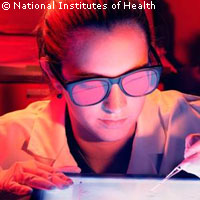Antibody helps fight cancer by 'starving' tumours
European researchers have discovered an antibody which effectively 'starves' cancerous tumours by blocking the growth of the blood vessels which feed them. The work, which was partly funded by the EU, is published in the journal Cell. Like all tissues, cancerous tumours rely on a network of blood vessels to supply them with oxygen and nutrients. With this in mind, a number of cancer drugs have been developed which aim to block the development of new blood vessels (a process called angiogenesis) in the tumour, effectively starving it to death. Currently, these therapies aim to block the action of a molecule called vascular endothelial growth factor (VEGF), which is responsible for promoting the growth of new blood vessels. However, while these VEGF inhibitors are successful in stunting blood vessel growth in tumours, they also affect blood vessel growth in healthy tissues. This causes a number of serious side effects, including blood clots, high blood pressure and miscarriage. Furthermore, many tumours become resistant to the effects of the VEGF inhibitors, thereby reducing their effectiveness in the longer term. This is because the initial strong effect of the drug leads to such a severe lack of oxygen in the tumour that it triggers a 'rescue mechanism' which stimulates the production of alternative blood vessel growth factors. In this latest study, the researchers looked at a molecule called TB-403, an antibody which blocks the action Placental Growth Factor (PlGF), another molecule responsible for promoting blood vessel growth in tumours. Unlike VEGF, PlGF is not found in healthy tissue. Tests in mice revealed the antibody to be effective at blocking the growth and spread of many kinds of cancer, including those that have become resistant to VEGF inhibiting drugs. Furthermore, it boosted the anti-tumour effect of chemotherapy and enhanced the sensitivity of tumours to anti-VEGF drugs. Importantly, the anti-PlGF drug did not induce the severe side effects associated with VEFG inhibitors. Moreover, because the anti-PlGF drug does not have such a strong effect as the VEGF inhibitor, it does not cause oxygen levels in the tumour to fall so low that the 'rescue mechanism' is triggered. 'The vast majority of anti-angiogenic agents inhibit VEFG or its main receptor. Since they work in the same way, a combination treatment of these agents hasn't added much benefit in prolonging the survival of cancer patients,' said Professor Peter Carmeliet of the Flanders Institute for Biotechnology (VIB). 'We need complementary drug targets and we believe PlGF might be one. It needs to stand the test of time and rigorous clinical testing, but the findings in mice look promising.' The researchers are particularly excited about the potential of the new drug for people who are currently likely to be particularly badly affected by the side effects of VEGF inhibitors. These include children, pregnant women and patients at risk of blood clots. The drug could also be used to treat other conditions where the excessive growth of blood vessels is a problem, such as certain forms of blindness. According to Professor Carmeliet, it will be many years before full-scale clinical trials of the drug can take place in humans. Nevertheless, a 'humanised' version of the drug has been produced and a Phase I clinical trial, which tests for drug safety, could start soon. 'Today's publication in the prestigious journal Cell clearly highlights our ground-breaking research in the field of angiogenesis,' commented Professor Désiré Collen, CEO and Chairman of Flemish biotech company ThromboGenics. 'I am very excited that we will be able to move this drug candidate into the clinic later this year, given its great therapeutic potential, not only in cancer, but also in severe eye diseases that are the major causes of blindness.' EU funding for the study came from the ANGIOSTOP project, which is financed through the Sixth Framework Programme's 'Life sciences, genomics and biotechnology for health' thematic area.



